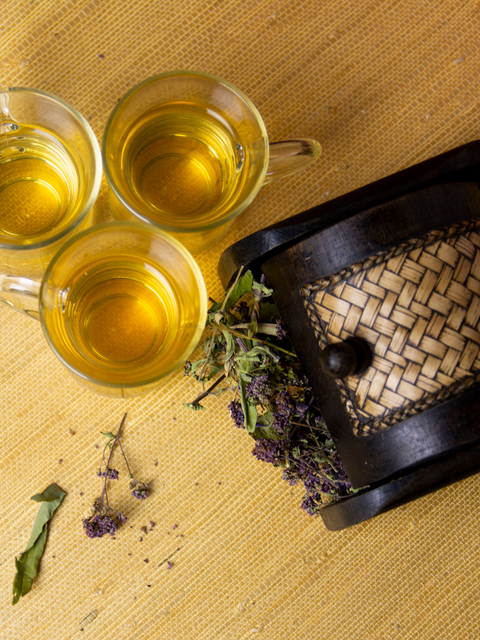
Anti-Inflammatory Herbs: Natural Remedies For A Healthy, Radiant Skin
Are you tired of the endless potions and lotions, full of ingredients you can’t pronounce? Reconnect with the power of nature and join us in our quest to discover the untamed potency of anti-inflammatory herbs – these little wonders are about to revolutionize your skincare game!
If irritation, redness, and stubborn skin woes relentlessly concern you, acavalry of organic and healing herbs has your back. Experience healthier, happier skin like never before with Sacred Rituel, and explore everything you need to know about anti-inflammatory herbs, including their benefits, and alternatives. We’ll also share our favorite anti-inflammatory herbs and some of our best tips for an anti-inflammatory lifestyle.
Want to take a shortcut and head straight to our ultra-nourishing and t anti-inflammatory face oil? Unlock nature's healing magic with our Sacred Serum, a potent elixir of revered plants. Try risk-free for 30 days and embrace your best self. Experience enchantment in a bottle today!
What Are Anti-Inflammatory Herbs?
Anti-inflammatory herbs are natural botanicals with powerful properties that reduce inflammation. These botanical gems contain active compounds that help alleviate various inflammatory conditions and promote overall well-being, and by welcoming these into your skincare routine or diet, you unlock their full potential and embrace their extraordinary benefits.

Combat Inflammation With Sacred Rituel and Nature’s PowersExperience the magic of anti-inflammatory herbs with Sacred Rituel. Reverse aging and revitalize your skin today, and embrace nature's healing powers for a healthier, radiant you. Discover the enchantment of holistic well-being and welcome a new era of skincare focused on clean, organic ingredients.
Unleash your skin’s potential and join us on this sacred journey toward radiant, sustainable beauty. |
Why Are Anti-Inflammatory Herbs Important?
Anti-inflammatory herbs are crucial for a healthy and radiant complexion. Their soothing properties calm irritated skin and reduce redness and discomfort. They also play a vital role in managing various skin conditions like acne, eczema, and rosacea and combat signs of aging such as fine lines, wrinkles, and dull skin. This significantly alleviates discomfort and helps you maintain a more youthful appearance.
How Do Anti-Inflammatory Herbs Work?
The magic of anti-inflammatory herbs lies in their ability to target the body's inflammatory response. These botanical wonders contain active compounds that inhibit the production of inflammatory molecules, resulting in reduced intensity and duration of inflammation. They also neutralize free radicals to combat oxidative stress and further inflammation. By gracefully modulating the body's inflammatory processes, these herbs lead the way to restoring balance and ushering in a healthier state.
Did you know? It’s been scientifically proven that you can reverse skin aging. While you can’t escape from natural aging, you can practice healthy eating and a mindful skincare routine to prevent and reverse superficial skin aging,¹ as well as help your skin regenerate, restore, and nourish itself.
Anti-inflammatory herbs like the ones we discuss here can significantly heal your body from the inside out, while potent and skin-adaptive products like Sacred Rituel’s Sacred Serum or Sacred Mist can nourish and restore your skin from the outside in.
What Are The Benefits Of Anti-Inflammatory Herbs?
Are you curious why we keepmentioning healthier skin as one of the effects of anti-inflammatory herbs? It might be pretty self-explanatory that less inflammation leads to an overall healthier skin, but it’s not just that – anti-inflammatory herbs can also give you other magnificent benefits, such as:
Reduced Inflammation
Anti-inflammatory herbs provide much-needed relief from inflammation, offering a soothing balm to some troublesome skin conditions. Their potency lies in their ability to target and counteract the inflammatory response within the body, so whether you're battling the persistent breakouts of acne, the relentless itch of eczema, the stubborn patches of psoriasis, or the telltale signs of redness, these herbs can come to your rescue and offer their calming touch to quell inflammation at its core. Their active compounds curb the intensity and duration of inflammation, so you can enjoy calmer and more revitalized skin.
Enhanced Skin Radiance
Besides reducing inflammation, these remarkable herbs also promote a balanced complexion that restores your skin's natural equilibrium. This results in a harmonious and balanced skin tone, which creates the perfect canvas for a luminous and radiant glow that seamlessly accentuates your beauty.
Skin Healing
With their soothing touch, anti-inflammatory herbs wonderfully provide relief and comfort to wounded or irritated skin. They delicately support the body's natural healing processes, helping mend and rejuvenate damaged skin, and as inflammation is eased, your skin can find the ideal environment for healing and recover more efficiently.
Antioxidant Protection
Many anti-inflammatory herbs are abundant in antioxidants that act as guardians, neutralizing free radicals and shielding the skin from oxidative damage and premature aging. These herbs become formidable allies in the battle against harmful substances and tirelessly counteract the damaging effects of free radicals, preserving your skin's youthful vitality and radiance.
Want to learn more about different plants and how they can help you? Check out Marysia’s herbal apothecary book! Marysia is our product formulator and co-founder, and in that book, she shares long-held knowledge about growing medicine, processing plants, and making remedies – all in harmony with the seasons. Learn the ways of nature, naturally enhance your beauty, and restore the planet with us.
Are There Any Downsides To Anti-Inflammatory Herbs?
Of course, everything we consume or apply to our skin may cause different effects depending on your body’s unique reactions. Some individuals may find themselves allergic to certain anti-inflammatory herbs, so always do a patch test before using them! It’s also best to consider whether the herb you want to use has potential side effects when it interacts with certain medications or supplements.
What Are The Alternatives To Anti-Inflammatory Herbs?
If you’d like to achieve reduced inflammation without using herbs, we have a few alternatives in line for you. If you’re up for it, you can even mix and match by pairing a few of these alternatives with each other for better results! For instance, you can always do some stress management while using anti-inflammatory herbs to improve your overall health and skin, or modify your diet and boost things with botanical gems!
Dietary Modifications
Our co-founder and product formulator, Marysia, actually has a favorite saying for this!
“Eat your rainbow as much as you’re putting it on your skin.”
Essentially, eating the rainbow means using and consuming a variety of flavonoids and antioxidants in your diet and skincare routine. To achieve this, you’ll need to proactively be mindful of the components that the things they use and eat have, and actively choose to add them to your daily life. By filling your plate with a vibrant array of fruits, vegetables, whole grains, and healthy fats, you lay the foundation for reducing inflammation throughout your body, including your skin.
Stress Management
In our fast-paced modern world, stress has become an all-too-common companion in our daily lives. This silent adversary can take a toll on our bodies, which can lead to inflammation and manifest in various skin conditions such as acne, eczema, and psoriasis.
So, one way to reduce inflammation without anti-inflammatory herbs is by managing your stress through meditation, yoga, regular exercise, or other calming activities. As you delve into these stress-reducing practices, you create a sanctuary of well-being, a space where your skin can thrive without the burden of stress-induced inflammation.
Consulting A Healthcare Professional
If you’re running out of options and inflammation relentlessly attacks you, consider visiting a dermatologist or healthcare professional. They can provide personalized recommendations and treatments tailored to your needs. Ultimately, it’s best to explore your options and find what works best for you and your skin's needs.
The Anti-Inflammatory Lifestyle
If you've been struggling with inflammation and want actionable changes to restore your skin's best health, embracing an anti-inflammatory lifestyle may unlock your skin's true potential. This transformative path is filled with simple steps to empower you to take charge of your health and reclaim your skin's radiance, such as:
- Nourish with Nature: Build a foundation of healing by incorporating a vibrant array of fruits, vegetables, whole grains, and healthy fats into your diet. This is why we like saying eat your rainbow, and put it on your skin, too! Basically, consume foods with plenty of flavonoids and antioxidants to help you heal from within, and find skin superfoods abundant with nutrients to restore your skin from the outside.
- Mindful Movement: Engage in stress-reducing activities like yoga, meditation, or regular exercise to tame the inflammatory effects of stress. These practices will not only soothe your mind but also create a harmonious environment for your skin to thrive.
- Skincare Rituals: Treat your skin with love and care by using gentle and plant-based skincare products. Pamper your skin and respect its natural balance by choosing products like Sacred Rituel’s Sacred Serum and Rose Mist toner, both guaranteed to adapt to your skin and restore its radiant glory.
- Hydration Magic: Hydrate your body by drinking plenty of water throughout the day. Staying hydrated supports healthy skin function and flushes out toxins, contributing to a more enhanced complexion.
- Restful Slumber: Prioritize quality sleep to allow your body and skin to rejuvenate. A well-rested body can better combat inflammation and promote cellular repair, leaving your skin refreshed and glowing.
- Reduce Toxins: Minimize exposure to harmful chemicals and pollutants by choosing clean and non-toxic household and personal care products. Always prioritize vegan skincare products that won’t clog your pores, like Sacred Rituel’s offerings. This step will help your skin breathe freely and flourish without unnecessary burdens.
Learn more about the best skincare practices, nature’s most magical herbs, or Sacred Rituel’s mission to unveil the secrets of radiant skin and embrace the enchantment of holistic well-being. With these tips and your commitment to the transformative journey ahead, you'll pave the way for a rejuvenated and radiant self inside and out.
Common Anti-Inflammatory Herbs And Their Properties
When it comes to combating inflammation, nature provides us with an array of incredible herbs that can work wonders for our skin. Here are some common anti-inflammatory herbs and their remarkable properties:
- Turmeric: This vibrant yellow herb features curcumin, a potent anti-inflammatory compound known for its ability to soothe skin irritations and promote a healthy complexion.²
- Ginger: With its warming properties, ginger acts as a natural anti-inflammatory agent that can help calm and revitalize the skin, reducing redness and promoting a youthful glow.³
- Chamomile: Known for its soothing effects, chamomile is packed with anti-inflammatory properties that can alleviate skin irritations, such as eczema and rosacea, while also promoting a sense of relaxation.⁴
- Calendula: With its gentle and healing properties, calendula can soothe and nourish sensitive or damaged skin.⁵ Its anti-inflammatory compounds reduce redness and promote a more balanced complexion.
How Do You Incorporate Anti-Inflammatory Herbs Into Your Diet?
Clueless about how you can use those famous anti-inflammatory herbs? You can add them to your diet in several ways:
Golden Milk
Prepare a delicious turmeric-based beverage by combining turmeric, ginger, and a pinch of black pepper with warm milk or a dairy-free alternative. Enjoy this soothing drink as a morning or evening ritual to harness the power of anti-inflammatory herbs.
Herbal Infusions
Brew a cup of chamomile or calendula tea to sip on throughout the day. These herbal infusions can help reduce inflammation and promote a calm, radiant complexion. You can also find organic turmeric and ginger tea or lemon and ginger tea or something similar.
Fresh Herbs In Salads
Sprinkle freshly chopped herbs like parsley, cilantro, or basil to your salads and dishes. These infuse your meals with vibrant flavors and give you a delightful dose of anti-inflammatory goodness. Elevate your meals to a whole new level of deliciousness and wellness while savoring the enchanting essence of these magical herbs!

Our Picks For Top-Tier Anti-Inflammatory Herbs
Now, let’s talk about our favorite anti-inflammatory herbs! You’ll find all of them in our enchanting Sacred Serum, a potent elixir of nature’s most revered plants. These meticulously studied and selected herbs can help nurture your skin and provide a natural boost of radiance:
- Lavandula Angustifolia (Lavender): Lavender, a fragrant and delicate herb with slender purple blossoms, is cherished for its soothing and calming properties. Its potent anti-inflammatory components harmoniously reduce inflammation to alleviate skin irritations and promote a healthier and more tranquil complexion.⁶
- Helichrysum Stoechas (Helichrysum): Helichrysum, an aromatic herb with golden-yellow blooms, possesses remarkable anti-inflammatory properties. Its soothing touch gently reduces inflammation and irritation on the skin, thanks to the unique combination of terpenes and flavonoids.⁷
- Matricaria Recutita (Chamomile): Chamomile, with its dainty white petals and golden center, is celebrated for its anti-inflammatory and calming nature. This gentle herb is noted for its minor healing, non-comedogenic, anti-inflammatory, and even anti-fungal properties,⁴ making it especially beneficial for those with sensitive skin or blemishes.
- Symphytum Officinale (Comfrey): Comfrey, an herb with broad green leaves and clusters of delicate purple or white flowers, was often topically applied to aid wound healing and reduce inflammation. Its roots and leaves are rich in allantoin, a substance that promotes the growth of new skin cells, alongside other compounds that effectively reduce inflammation.⁸
- Calendula Officinalis (Calendula): Calendula, a vibrant and cheerful herb with bright orange or yellow flowers, is a favored ingredient in skincare products for its ability to soothe and calm irritated skin.⁵ Versatile and nurturing, calendula can be incorporated into lotions, balms, teas, and oils, offering a delightful touch of healing magic for your skin.
- Rosa Damascena (Rose): Rose extract and rose flower oil, derived from the delicate and captivating blooms of the rose bush, boasts carotenoids and crucial minerals like zinc, magnesium, and calcium, providing further benefits in soothing inflammation and protecting the skin from sun damage.⁹
- Arnica Montana (Arnica): Arnica, a herb with vibrant yellow flowers, is frequently used in traditional medicine for relieving muscle soreness and inflammation when applied topically.¹⁰ This remarkable herb can also soothe the skin by calming inflammation at the affected area, leading to reduced scratching and less skin irritation.
- Camellia Sinensis (Sencha Green Tea): Green tea extract from Camellia sinensis, a plant with glossy green leaves and delicate white flowers, is renowned for its richness in antioxidants and anti-inflammatory effects.¹¹ Laden with powerful antioxidants that combat free radicals, sencha green tea has been noted to reduce inflammation, lower cholesterol, and boost the immune system, while the significant dose of caffeine can also elevate one's mood.
Scientific Evidence And Research On The Effectiveness Of Anti-Inflammatory Herbs
At the core of our passion for anti-inflammatory herbs is the power of scientific research. While we cherish traditional wisdom and stories, ongoing research enriches our understanding. We've backed our claims with reputable studies, offering concrete evidence of each herb's effectiveness. Explore our Sources section to unveil the enchanting science behind these magical botanicals!
Instantly Reduce Inflammation With Sacred Rituel
It’s a hard decision if you ask us to pick just five anti-inflammatory herbs, but we’d love to tell you all about why we’re in love with these – these herbs are known as vulneraries. Vulneraries are herbs that speed up your skin’s ability to heal wounds, regenerate, and create healthy new skin cells. They also help you produce collage and instantly reduce inflammation, puffiness, and redness. Are you ready to discover what they are?
They’re lavender, chamomile, calendula, arnica, and comfrey! All five of these enchanting herbs possess the magical qualities of vulneraries, making them a perfect team to restore and revitalize your skin. Their potent healing properties work harmoniously to accelerate skin repair, stimulate the generation of new skin cells, and aid in collagen production, leaving you with a rejuvenated and radiant complexion.
Pair them with over 20 more potent ingredients, and you’ve got our Sacred Serum! Sacred Serum face oil is a transformative elixir overflowing with bioactive nutrients, meticulously chosen to nourish and protect your skin. Immerse yourself in nature’s healing embrace and experience enchantment in a bottle today!
Final Thoughts
Endless options of potions and lotions can be overwhelming, but the untamed power of anti-inflammatory herbs brings a breath of fresh air and a promise of revitalized skin. Embrace the wonders of nature with Sacred Rituel and discover the magical benefits of these remarkable herbs today.
Sacred Rituel's Sacred Serum stands as a testament to the potent healing properties of these herbs. Crafted with raw, organic perfection, this elixir combines 28 potent ingredients. Its symphony of skin nourishment and transformation harmoniously unfolds, leaving you with age reversal, radiant glow, and revitalizing moisture.
Join countless others on their restorative healing journey and discover the enchanting power of Sacred Serum. Try it risk-free for 30 days and unleash the magic of nature on your skin!
Interested in similar articles? See these:
FAQs
Can anti-inflammatory herbs replace medical treatments for skin conditions?
Anti-inflammatory herbs can complement conventional medical treatments but should not be used as a sole substitute. Talk to a healthcare professional for personalized advice on managing specific skin conditions.
Are there any specific anti-inflammatory herbs suitable for sensitive skin?
Chamomile and calendula are known for their gentleness, making them suitable choices for sensitive skin. However, everyone's skin is unique, so test any new herb on a small area before applying it more widely.
Can I consume anti-inflammatory herbs in capsule form?
Many anti-inflammatory herbs are available in capsule form, but it's crucial to follow the recommended dosage and consult a healthcare professional before adding any new supplements to your routine.
How long does it typically take to see results when using anti-inflammatory herbs for skincare?
Results can vary depending on the individual and the specific herb being used. Remember that natural remedies often require consistent use to observe noticeable improvements in the skin's health and appearance.
What is the most powerful anti-inflammatory herb?
While several herbs have potent anti-inflammatory properties, it's difficult to determine a single herb as the most powerful. However, turmeric, ginger, boswellia, and green tea are notable for their anti-inflammatory effects.
What home remedies reduce inflammation?
Various home remedies can reduce inflammation naturally. Cold compresses applied to the affected area can provide temporary relief, while gentle massages with essential oils like lavender or chamomile can soothe inflammation. Additionally, incorporating a balanced diet rich in fruits, vegetables, and healthy fats may contribute to reducing inflammation.
What cures inflammation fast?
While there is no instant cure for inflammation, some strategies can alleviate symptoms and promote healing. These include managing stress levels, getting adequate sleep, maintaining a healthy diet, staying hydrated, and following any prescribed medical treatments. It's important to remember that consistent efforts and a holistic approach are key to addressing inflammation effectively.
Are anti-inflammatory herbs suitable for everyone?
While anti-inflammatory herbs are generally safe for most individuals, specific herbs may not be suitable to ingest for pregnant or breastfeeding women, people with certain medical conditions, or those taking specific medications. Consult a healthcare professional to determine the suitability and safety of anti-inflammatory herbs for your circumstances.
Can anti-inflammatory herbs help with chronic conditions like arthritis?
Anti-inflammatory herbs may provide some relief and support for chronic conditions like arthritis. Certain herbs, such as turmeric and ginger, have shown promising anti-inflammatory effects and may help reduce joint pain and inflammation. However, it's important to consult with a healthcare professional to determine the appropriate use and dosage of these herbs in managing chronic conditions.
Are there any specific storage requirements for anti-inflammatory herbs?
Proper storage can help maintain the potency and freshness of anti-inflammatory herbs. It's generally recommended to store dried herbs in airtight containers, away from direct sunlight, moisture, and excessive heat. Fresh herbs can be stored in the refrigerator, wrapped in a damp paper towel or placed in a jar with water, like cut flowers, to extend their shelf life.
Sources
- Zouboulis, C. C., Ganceviciene, R., Liakou, A. I., Theodoridis, A., Elewa, R., & Makrantonaki, E. (2019). Aesthetic aspects of skin aging, prevention, and local treatment. Clinics in dermatology, 37(4), 365–372. https://doi.org/10.1016/j.clindermatol.2019.04.002
- Hewlings, S. J., & Kalman, D. S. (2017). Curcumin: A Review of Its Effects on Human Health. Foods (Basel, Switzerland), 6(10), 92. https://doi.org/10.3390/foods6100092
- Mashhadi, N. S., Ghiasvand, R., Askari, G., Hariri, M., Darvishi, L., & Mofid, M. R. (2013). Anti-oxidative and anti-inflammatory effects of ginger in health and physical activity: review of current evidence. International journal of preventive medicine, 4(Suppl 1), S36–S42.
- Singh, O., Khanam, Z., Misra, N., & Srivastava, M. K. (2011). Chamomile (Matricaria chamomilla L.): An overview. Pharmacognosy reviews, 5(9), 82–95. https://doi.org/10.4103/0973-7847.79103
- Parente, L. M., Lino Júnior, R.deS., Tresvenzol, L. M., Vinaud, M. C., de Paula, J. R., & Paulo, N. M. (2012). Wound Healing and Anti-Inflammatory Effect in Animal Models of Calendula officinalis L. Growing in Brazil. Evidence-based complementary and alternative medicine : eCAM, 2012, 375671. https://doi.org/10.1155/2012/375671
- Kajjari, S., Joshi, R. S., Hugar, S. M., Gokhale, N., Meharwade, P., & Uppin, C. (2022). The Effects of Lavender Essential Oil and its Clinical Implications in Dentistry: A Review. International journal of clinical pediatric dentistry, 15(3), 385–388. https://doi.org/10.5005/jp-journals-10005-2378
- Antunes Viegas, D., Palmeira-de-Oliveira, A., Salgueiro, L., Martinez-de-Oliveira, J., & Palmeira-de-Oliveira, R. (2014). Helichrysum italicum: from traditional use to scientific data. Journal of ethnopharmacology, 151(1), 54–65. https://doi.org/10.1016/j.jep.2013.11.005
- Staiger C. (2013). Comfrey root: from tradition to modern clinical trials. Wiener medizinische Wochenschrift (1946), 163(3-4), 58–64. https://doi.org/10.1007/s10354-012-0162-4
- Lee, M. H., Nam, T. G., Lee, I., Shin, E. J., Han, A. R., Lee, P., Lee, S. Y., & Lim, T. G. (2018). Skin anti-inflammatory activity of rose petal extract (Rosa gallica) through reduction of MAPK signaling pathway. Food science & nutrition, 6(8), 2560–2567. https://doi.org/10.1002/fsn3.870
- Smith, A. G., Miles, V. N., Holmes, D. T., Chen, X., & Lei, W. (2021). Clinical Trials, Potential Mechanisms, and Adverse Effects of Arnica as an Adjunct Medication for Pain Management. Medicines (Basel, Switzerland), 8(10), 58. https://doi.org/10.3390/medicines8100058
- Ohishi, T., Goto, S., Monira, P., Isemura, M., & Nakamura, Y. (2016). Anti-inflammatory Action of Green Tea. Anti-inflammatory & anti-allergy agents in medicinal chemistry, 15(2), 74–90. https://doi.org/10.2174/1871523015666160915154443

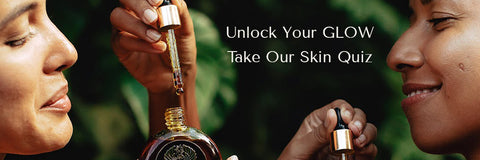

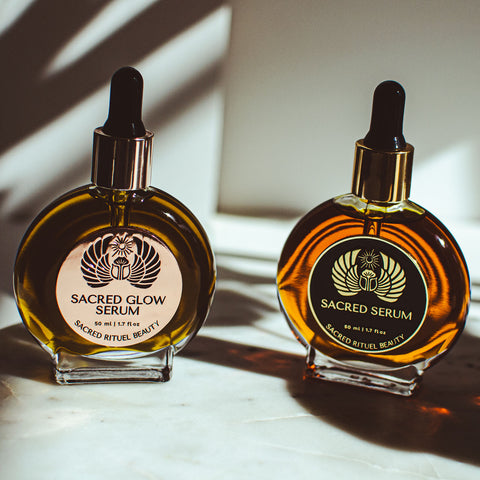
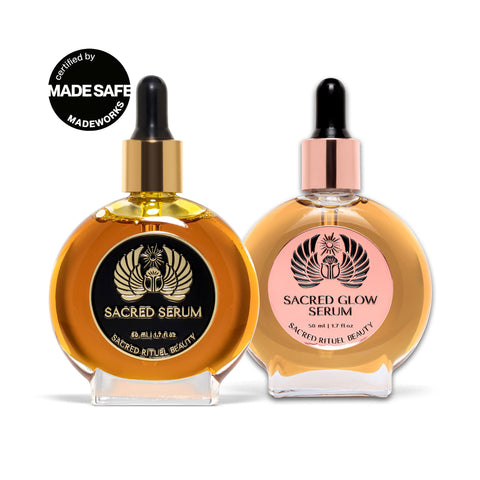
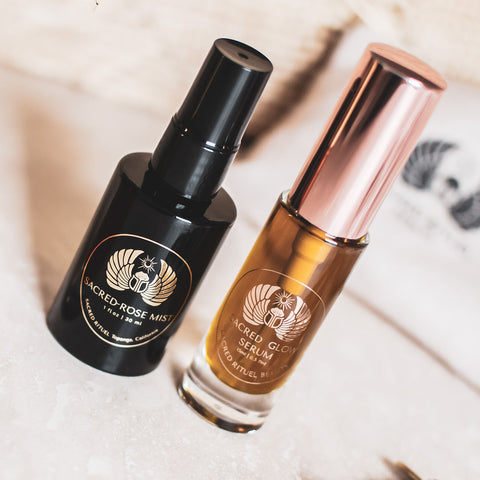
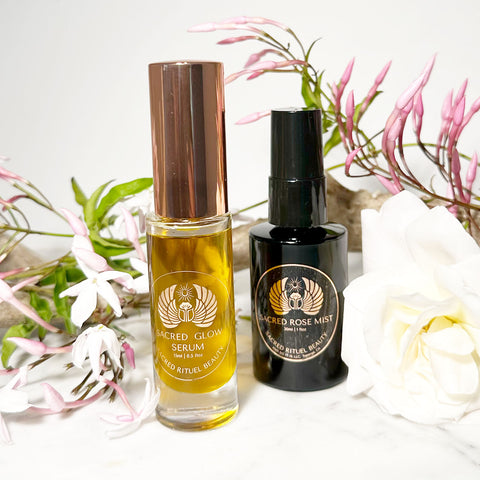
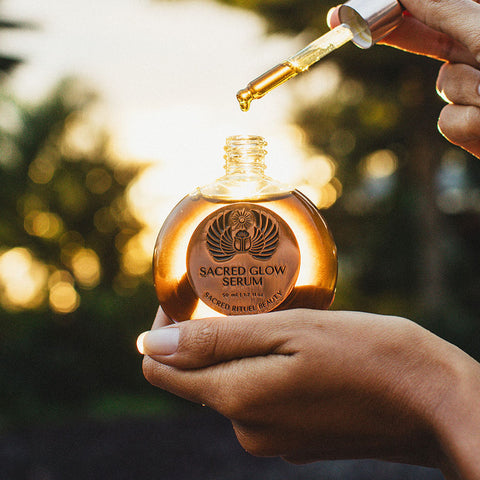
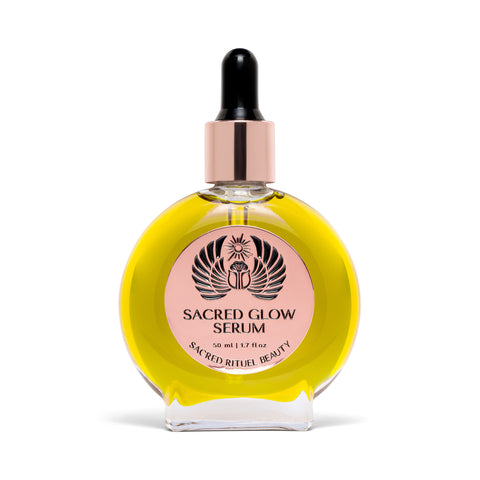
Comments (0)
There are no comments for this article. Be the first one to leave a message!